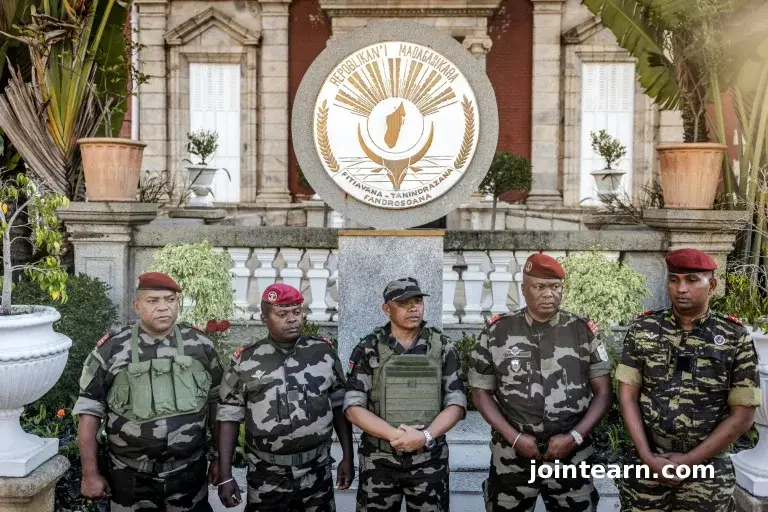
Antananarivo, Madagascar — October 17, 2025:
Madagascar has entered a new political era as Colonel Michael Randrianirina was officially sworn in as the nation’s president on Friday, following a dramatic military takeover that forced ex-president Andry Rajoelina to flee the country.
The ceremony at the presidential palace in Antananarivo capped off a week of political upheaval that saw the CAPSAT army unit, led by Randrianirina, seize control after accusing Rajoelina of “desertion of duty.”
The move — viewed by many as a military coup despite constitutional court backing — has drawn international concern while igniting hope among youth-led protest groups that spurred the uprising.
A Military-Led Political Transition Begins
In his inaugural address, President Randrianirina, 51, described the power shift as “a historic turning point” for Madagascar.
“We will work hand in hand with all sectors of our nation to draft a new constitution and organize transparent elections and referendums,” he declared.
He emphasized that the army’s intervention was carried out at the request of the constitutional court to “avoid anarchy and disorder” amid widespread protests.
The CAPSAT unit’s decision to side with anti-government demonstrators proved pivotal, ending weeks of unrest triggered by frequent power outages, economic hardship, and growing public discontent with Rajoelina’s administration.
Ceremony Draws International and Domestic Attention
Randrianirina’s swearing-in ceremony drew attendance from military officials, political leaders, and foreign representatives from nations including the United States, France, Russia, and the European Union.
Wearing a dark suit instead of his military uniform, Randrianirina pledged to break with the past and guide Madagascar toward civilian-led governance.
“Our mission is to reform the country’s administrative, socio-economic, and political systems of governance,” he said in French. “We are committed to steering Madagascar toward national renewal.”
The new leader also praised the youth movement that helped bring down Rajoelina, calling them the “driving force of change.”
Ex-President Andry Rajoelina in Hiding
The ousted president, Andry Rajoelina, fled Madagascar last weekend after the military turned against him. According to reports, he was evacuated on a French military aircraft to Réunion Island before traveling on to Dubai.
Rajoelina’s supporters have condemned the constitutional court’s approval of Randrianirina’s takeover as “illegal and politically motivated”, warning that it could destabilize the fragile island nation.
Despite accusations of corruption and authoritarianism, Rajoelina maintains that he is still the legitimate leader of Madagascar and is working from exile to “find solutions to the nation’s ongoing crisis.”
Youth-Led Uprising Sparks the Transition
The turning point came after weeks of protests that began on September 25, when thousands of young demonstrators took to the streets over severe power shortages and rising poverty.
Security forces initially responded with force, resulting in multiple deaths and injuries, according to human rights observers.
However, on October 11, the CAPSAT army unit announced it would no longer follow orders to fire on civilians, a move that effectively ended Rajoelina’s rule and triggered the military’s assumption of power.
Randrianirina has since promised free and fair elections within 18 to 24 months, stressing that the government will remain civilian-led and not a prolonged military regime.
International Reaction and Concerns
The United Nations, African Union (AU), and Southern African Development Community (SADC) have expressed deep concern over the developments, calling for constitutional order and civilian participation in the transition process.
French Foreign Minister Jean-Noël Barrot echoed these calls, saying:
“The transition is now under way. We call for the full involvement of civilians in the process. The voices of Madagascar’s youth must be heard to build a peaceful and lasting solution.”
Both the AU and SADC confirmed they would send fact-finding missions to Madagascar in the coming days to monitor the situation and assess the legitimacy of the power transfer.
Madagascar’s Troubled Political History
Madagascar’s latest upheaval adds to a long line of political instability since its independence from France in 1960.
This marks the third military-led transition in the island’s history, following coups in 1972 and 2009.
Despite its abundant natural resources and rich biodiversity, Madagascar remains one of the world’s poorest nations, with 80 percent of its 32 million citizens living below the poverty line, according to the World Bank.
The island’s volatile politics have repeatedly hindered economic development and foreign investment, leaving the country vulnerable to poverty, corruption, and environmental degradation.
Looking Ahead: Promises of Reform and Renewal
In his concluding remarks, President Randrianirina appealed for unity and patience as Madagascar embarks on what he called a “national renewal.”
He pledged to prioritize electoral reforms, economic revitalization, and anti-corruption efforts, while seeking international cooperation to stabilize the nation.
“Madagascar’s future lies in the hands of its people — together, we will restore trust, rebuild institutions, and secure our nation’s dignity,” Randrianirina said.
While his supporters hail him as a patriotic reformer, critics warn that the country may be entering another cycle of military dominance masked by civilian rhetoric.
The coming months will determine whether Randrianirina’s promises of democracy can withstand the pressures of history, power, and expectation.


Leave a Reply